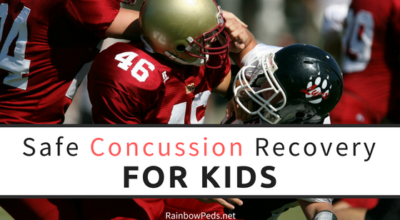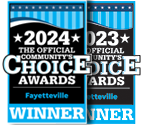Safe Concussion Recovery for Kids
Hundreds of thousands of children and adolescents experience concussions each year. While most recover within three weeks, some do not.
 The pressures to perform at our highest pushes many kids to return to sports and school too soon. Research shows that returning to school too early can worsen symptoms and prolong recovery. Returning to sports too soon also has its risks. In fact, returning to sports shortly after a concussion increases the risk of second-impact syndrome. Risks compound with each subsequent concussion, which exponentially increases the risk of permanent brain damage. To keep kids safe, parents must advocate for their health by knowing the signs of a concussion and acting accordingly.
The pressures to perform at our highest pushes many kids to return to sports and school too soon. Research shows that returning to school too early can worsen symptoms and prolong recovery. Returning to sports too soon also has its risks. In fact, returning to sports shortly after a concussion increases the risk of second-impact syndrome. Risks compound with each subsequent concussion, which exponentially increases the risk of permanent brain damage. To keep kids safe, parents must advocate for their health by knowing the signs of a concussion and acting accordingly.
Concussion Symptoms for Parents
- Nausea and vomiting
- Dizziness
- Headaches
- Blurry or double vision
- Sleeping more than normal or having trouble sleeping
- Difficulty focusing or concentrating
- Irritability or other mood changes
- Light sensitivity
- Noise sensitivity
- Trouble remembering things
- Numbness or tingling sensation
- Confusion
What Should Parents Do if Their Child has a Concussion?
If you suspect your child has a concussion, it is crucial that they are seen by their pediatrician or emergency department for testing and observation immediately. Not all concussions occur in sports. They can happen on the playground, or while riding a bicycle. The concussion you see in the movies isn’t always the case. A person can have a concussion without losing consciousness.
Safe Learning After a Concussion
Children and adolescents should not return to school until they can tolerate their symptoms for 45 minutes or longer. Depending on the severity of their symptoms, physical therapy may be an excellent option. The specialized testing and treatment provided by a vestibular therapist or concussion management therapist can provide children with tools to help them recover safely. Special accommodations may also be required in school to help the child properly transition back to their studies. Talk with your child’s pediatrician, school nurse, and administrator for a smooth and safe transition.
If you suspect your child may have experienced a concussion, contact our office immediately or visit the nearest emergency department. Monitor the child for any of the symptoms mentioned above and be prepared to share what happened to cause the suspected concussion. Any information you provide will help better diagnose a concussion and subsequent treatment. Responding quickly and appropriately will help your child recover fully and safely after a concussion.







